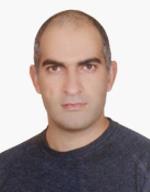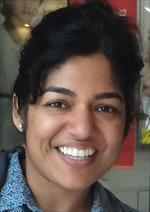
Jorge Arroyo Palacios
Postdoctoral Scholar
Department of Physiological Nursing
Research Team: Jorge Arroyo Palacios*, Karl Meisel, Nirav Shah, Michele Pelter, Xiao Hu
This RAP CTSI–SOS award will provide us support to carry out the project: “A Pilot Study with Wearable Devices to Detect Atrial Fibrillation”. The Precision Medicine Initiative considers the use of new mobile technologies an important area of research and encourages the development of new approaches for detecting, measuring and analyzing biomedical information. This pilot study sets out to contribute to this priority area of research. Our goals are to investigate the feasibility of using photoplethysmographic (PPG) sensors in a wearable device to detect paroxysmal AFib patterns, which will serve as preliminary data for a future NIH proposal. Our long term goals are: i) to determine the effectiveness of these new user friendly and noninvasive technologies; ii) to investigate how they can be integrated and implemented in practical, useful and engaging health applications; and iii) to apply this knowledge for the development of supportive assessment tools for AFib monitoring. This RAP award will also provide me support to continue developing my research career and allow me to explore innovative technologies and methodologies to solve a real-world problem.
* Contact PI
_____________________________________________________

Thuy Doan, MD, PhD
Clinical Instructor
Proctor Foundation/Department of Ophthalmology
Timely and accurate diagnosis of ocular infection is crucial for improving visual outcomes. However, existing diagnostic tests, such as culture and polymerase chain reaction (PCR), can only provide a diagnosis in 40-70% of cases, even where there is little doubt of an infectious etiology. Thus, there exists a need for innovative approaches to complement current conventional diagnostics in clinical ophthalmology. The RAP Pilot for Junior Investigators in Basic and Clinical/Translation Science Award will allow me to evaluate the performance of next-generation sequencing to identify pathogens in ocular samples from patients with clinical findings suspicious for infection. These studies have the potential to change the diagnostic paradigm in ophthalmology and facilitate interventions that improve or prevent ocular infections.
_____________________________________________________

Adam R. Ferguson, Ph.D.
Assistant Professor and Principal InvestigatorBrain and Spinal Injury Center (BASIC)
Department of Neurological Surgery
RAP Team Science Project Summary: Ferguson*, Vinogradov, Loewy, O’Donovan, Biagianti, Nielson
Treatment planning for schizophrenia relies entirely on the interpretation of a patient’s clinical presentation and phenomenology, seriously hampering our ability to develop personalized assessments of key underlying pathophysiologic processes, let alone to engage in biologically-informed medical decision-making, such as inflammatory biomarkers that may predict treatment response in clinical trials. The RAP Team Science grant will enable us to process existing serum samples from schizophrenia patients enrolled in cognitive training trials, in combination with the application of sophisticated machine learning algorithms to retrospectively analyze existing data, as well as to identify multivariate relationships between inflammatory cytokines on responsiveness to cognitive training. This grant bridges together experts in big-data approaches for accelerating translational discovery in central nervous system (CNS) disorders, inflammatory mechanisms in psychological trauma, and schizophrenia biomarkers and neurocognitive outcome assessment and training.
*contact PI
_____________________________________________________

Jennifer Graves, MD
, Ph.D.
Assistant Professor
Department of Neurology
Multiple sclerosis (MS) is a leading cause of neurological injury in young adults. Capturing the extent of multiple domains of MS-related disability is critical for effective clinical care and the development of new paradigms for patient-focused therapeutic approaches. To date outcomes research in MS has centered on periodic clinical exams, which may be insensitive to changes over the short term (the 1-2 years of early stage clinical trials) and only capture a single semi-quantitative snapshot of the patient’s performance. With the advent of mass production of sensors in the gaming and computer control industry, there is an opportunity to extend the traditional neurological exam with biosensors already in use outside the realm of health applications. With the critical support of the RAP Digital Health pilot grant we will validate a wearable electromyography device for detection of upper and lower limb dysfunction in MS patients. This device can be placed in the clinical setting in a non-disruptive fashion with minimal alteration of the standard neurological exam, yet provide discrete data capture of function. Support from RAP is critical to the development of this tool, which has potential applications in neurology beyond MS.
_____________________________________________________

Cassie Kline-Nunnaly, MD
Clinical Fellow
Department of Hematology/Oncology
UCSF Benioff Children’s Hospital
Currently, over 4000 new pediatric brain tumor cases are diagnosed each year and more than 50,000 children are living with a diagnosis of brain tumor in the US. Pediatric brain tumor patients can go on to develop severe neurocognitive deficits related to their surgical, medical, and radiation-based therapies. Although average outcomes have shown significantly lower scores when compared to population means, there remains great variability among individual outcomes. The RAP grant for Under-Represented Faculty & Senior Fellows in Clinical and Translational Research Awards will allow me to investigate the potential role of KLOTHO protein as a biomarker for neurocognitive outcomes in pediatric brain tumor patients and hopefully lead to improved risk stratification, support for lowering therapy exposures in the most vulnerable patients, and provide preliminary data and support for a future, prospective NIH grant application. I greatly appreciate this support as I embark on the beginning of my academic career.
_____________________________________________________

Ali Mirzazadeh, MD, MPH, PhD
Assistant Professor
Department of Epidemiology and Biostatistics & Global Health Sciences
People who inject drugs (PWID) are the most severely affected population for HIV and HCV in Iran. Prevention approaches implemented include medically assisted treatment (MAT) for drug dependence, syringe exchange, and condom distribution all provided free of charge. However unsafe injection and unprotected sex are frequently reported among PWID. There is ample evidence that MAT reduces HIV and HCV risk in multiple populations, but little research has been done on this understudied, hard-to-reach, most-at-risk population in Iran (nor in the Middle East, for that matter). This study aims to adapt a set of recruitment and retention tools successful in a long running study of PWID in San Francisco (the UFO Study) to the Iranian context and pilot test feasibility and acceptability of recruiting and retaining a prospective research study of PWID in Kerman, Iran. This will lay the groundwork for a platform of HIV and HCV prevention studies in Iran in collaboration with UCSF. The study jointly funded by the CFAR-RAP, Kerman University of Medical Sciences, and Iran Ministry of Health.
_____________________________________________________

Jyoti Mishra, Ph.D.
Assistant Professor
Department Neurology, Psychiatry & Global Health Sciences
There is a huge opportunity for neural processes underlying human cognition to be optimized. This is applicable to healthy humans as well as the diverse set of neuropsychiatric, cognitively impaired populations. We have recently developed a non-invasive electroencephalography (EEG)-based, neural deficit-targeted and personalized brain computer interface (BCI) technology, that for the first time can be used to selectively enhance function in specific neural networks underlying cognition in humans. We refer to this technology as a Cognitive BCI or CBCI. This grant will allow us to pilot the CBCI technology in healthy humans and ascertain its feasibility and initial efficacy.
_____________________________________________________

Olga Tymofiyeva, Ph.D.
Assistant Professional Researcher
Department of Radiology and Biomedical Imaging
Can the brain "rewire" itself as a result of therapeutic interventions? This RAP Pilot Award will help us investigate this question. The goal of our BrainChange study is to use MRI imaging to observe brain changes (plasticity) in youth who undergo a training of attention and emotion regulation. Youth of age 10-18 years will undergo a 12-session group training, in which they will learn self-regulation skills, such as breathing and meditation, that can help them slow down, better regulate emotions, and improve attention and focus. The efficiency of the training will be assessed using a computer-based attention test, before and after the training period, and MRI scans will be performed to see the changes in structural and functional brain networks. We believe that this research will enable us to develop effective cognitive training programs for children and help them achieve their full potential for healthy and productive lives. Webpage: https://radiology.ucsf.edu/research/labs/BrainChange.
_____________________________________________________